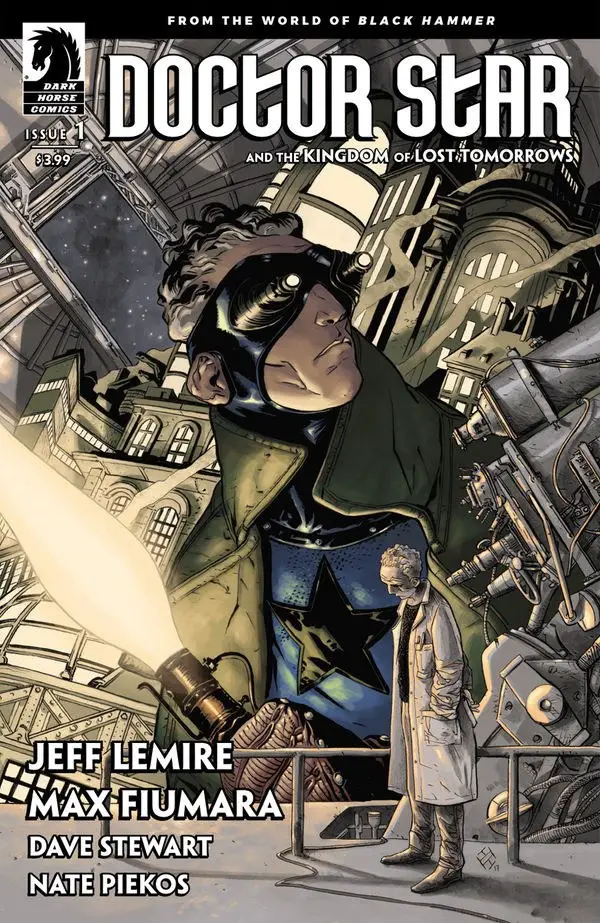[amazon_link asins=’1506706592′ template=’AiPTProductAd’ store=’aiptcomics-20′ marketplace=’US’ link_id=’34a9b1b3-df1a-11e8-a26c-b761ce62b60c’]
Dr. Jim Robinson wanted to touch the stars, toiling for years to harness their power and travel beyond our world. He became the superhero known as Doctor Star, often leaving his wife and child at home to go fight in the Second World War alongside the other costumed warriors of the era, many of whom have been featured in the series this title spun out of, Black Hammer. He was a hero to many, most of all his young son, Charlie. But Dr. Robinson wanted to keep going, to extend his light to the rest of the universe.
One day, he went too far.

Dark Horse Comics
To say anything more would spoil the plot of this beautiful story, but believe me when I say there has never been a superhero tale quite like this one.
Like the majority of the Black Hammer universe’s characters, Doctor Star is a pastiche made from many different sources, mostly Green Lantern and Starman, both characters with rich histories of passing their mantles on to the next generation of heroes. For Green Lantern, it was the passing of the torch from Alan Scott to Hal Jordan, then to a whole universe of new Lanterns. A major part of the Jack Knight Starman series dealt with the complications of being part of a family line of superheroes and the frustrations of that responsibility, about the rejection of destiny. It is interesting that so much of this story is about the distant relationship between a father and his child, then. Doctor Star is based on legacy characters, but due to his own arrogance and lust for adventure, he essentially has no legacy of his own.

Dark Horse Comics
The narration of the series is presented as a story Robinson is telling to his son Charlie. Robinson attempts to justify his actions and explain why he felt the call to the stars, recounting his origin story and the adventures that caused him to become a man without a home to go back to. Lemire’s script is somber and arresting, fully immersing us in the splendor of a life in the cosmos before bringing us back down with a harsh dose of reality. Readers will also appreciate the allusions to works that inspired this tale (I particularly like that Doctor Star’s civilian identity is derived from Starman writer James Robinson). Max Fiumara’s pencils evoke a pulpiness that brings to mind a Hellboy or B.P.R.D. story, befitting the Golden Age throwback tone.
At its core, this is a story of a father and son and their responsibilities toward one another. It’s about trying to live up to the expectations of others and to look past your own feelings of inadequacy to see the people who depend on you. It’s about appreciating the life you have while you still have it. It’s only while looking back on his own life through the lens of how he impacted others that Doctor Star realizes, like another famous rocket man before him, “it’s lonely out in space.”
All in all, Doctor Star and the Kingdom of Lost Tomorrows feels like the perfect companion to its parent series, but can still be enjoyed and appreciated independently of it. In fact, I read this miniseries as it came out in single issues and it served as my introduction to Jeff Lemire’s “Hammerverse” and I’m extremely grateful for it! The trade also comes with several pages of early sketches for covers and interior panels, as well as some commentary from Lemire and Fiumara explaining some of their creative process in crafting the look of the book and its characters. I highly recommend this book to anyone looking for a comic that delves deeper into the human soul than the average superhero story.
Join the AIPT Patreon
Want to take our relationship to the next level? Become a patron today to gain access to exclusive perks, such as:
- ❌ Remove all ads on the website
- 💬 Join our Discord community, where we chat about the latest news and releases from everything we cover on AIPT
- 📗 Access to our monthly book club
- 📦 Get a physical trade paperback shipped to you every month
- 💥 And more!














You must be logged in to post a comment.